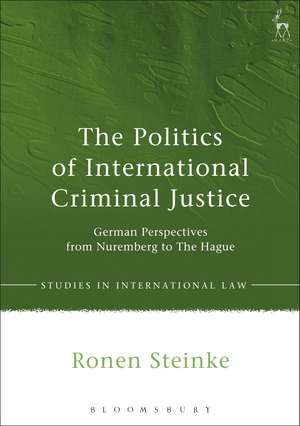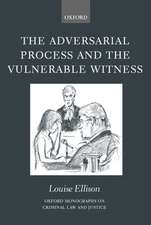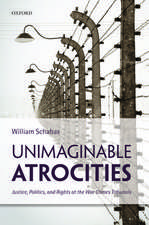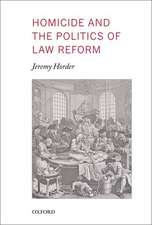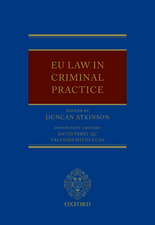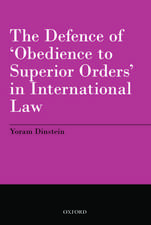The Politics of International Criminal Justice: German Perspectives from Nuremberg to The Hague: Studies in International Law
Autor Ronen Steinkeen Limba Engleză Hardback – 24 mai 2012
Din seria Studies in International Law
- 30%
 Preț: 570.51 lei
Preț: 570.51 lei - 30%
 Preț: 538.77 lei
Preț: 538.77 lei - 30%
 Preț: 571.24 lei
Preț: 571.24 lei - 30%
 Preț: 598.45 lei
Preț: 598.45 lei - 21%
 Preț: 275.26 lei
Preț: 275.26 lei - 34%
 Preț: 511.07 lei
Preț: 511.07 lei - 30%
 Preț: 571.34 lei
Preț: 571.34 lei - 23%
 Preț: 249.26 lei
Preț: 249.26 lei - 18%
 Preț: 297.20 lei
Preț: 297.20 lei - 30%
 Preț: 573.05 lei
Preț: 573.05 lei - 30%
 Preț: 1138.79 lei
Preț: 1138.79 lei -
 Preț: 448.37 lei
Preț: 448.37 lei - 28%
 Preț: 406.31 lei
Preț: 406.31 lei - 21%
 Preț: 270.97 lei
Preț: 270.97 lei - 30%
 Preț: 570.43 lei
Preț: 570.43 lei - 30%
 Preț: 836.82 lei
Preț: 836.82 lei - 14%
 Preț: 570.43 lei
Preț: 570.43 lei - 30%
 Preț: 512.37 lei
Preț: 512.37 lei - 30%
 Preț: 511.14 lei
Preț: 511.14 lei - 30%
 Preț: 954.11 lei
Preț: 954.11 lei - 30%
 Preț: 572.47 lei
Preț: 572.47 lei - 30%
 Preț: 603.73 lei
Preț: 603.73 lei - 30%
 Preț: 779.50 lei
Preț: 779.50 lei - 14%
 Preț: 837.54 lei
Preț: 837.54 lei - 14%
 Preț: 574.92 lei
Preț: 574.92 lei - 30%
 Preț: 898.78 lei
Preț: 898.78 lei - 30%
 Preț: 576.40 lei
Preț: 576.40 lei - 30%
 Preț: 719.91 lei
Preț: 719.91 lei - 30%
 Preț: 599.66 lei
Preț: 599.66 lei - 12%
 Preț: 233.46 lei
Preț: 233.46 lei - 30%
 Preț: 779.50 lei
Preț: 779.50 lei - 30%
 Preț: 570.43 lei
Preț: 570.43 lei - 14%
 Preț: 779.09 lei
Preț: 779.09 lei - 30%
 Preț: 540.38 lei
Preț: 540.38 lei - 30%
 Preț: 573.86 lei
Preț: 573.86 lei - 30%
 Preț: 570.43 lei
Preț: 570.43 lei - 30%
 Preț: 515.24 lei
Preț: 515.24 lei - 30%
 Preț: 573.70 lei
Preț: 573.70 lei - 30%
 Preț: 720.23 lei
Preț: 720.23 lei - 28%
 Preț: 500.25 lei
Preț: 500.25 lei - 30%
 Preț: 542.02 lei
Preț: 542.02 lei - 30%
 Preț: 540.48 lei
Preț: 540.48 lei - 30%
 Preț: 778.12 lei
Preț: 778.12 lei - 30%
 Preț: 784.00 lei
Preț: 784.00 lei - 22%
 Preț: 571.24 lei
Preț: 571.24 lei - 14%
 Preț: 779.09 lei
Preț: 779.09 lei - 30%
 Preț: 779.91 lei
Preț: 779.91 lei - 30%
 Preț: 543.57 lei
Preț: 543.57 lei
Preț: 435.31 lei
Preț vechi: 602.79 lei
-28% Nou
Puncte Express: 653
Preț estimativ în valută:
83.30€ • 86.07$ • 69.29£
83.30€ • 86.07$ • 69.29£
Carte tipărită la comandă
Livrare economică 19 martie-02 aprilie
Preluare comenzi: 021 569.72.76
Specificații
ISBN-13: 9781849463133
ISBN-10: 1849463131
Pagini: 160
Dimensiuni: 156 x 234 x 10 mm
Greutate: 0.39 kg
Ediția:New.
Editura: Bloomsbury Publishing
Colecția Hart Publishing
Seria Studies in International Law
Locul publicării:London, United Kingdom
ISBN-10: 1849463131
Pagini: 160
Dimensiuni: 156 x 234 x 10 mm
Greutate: 0.39 kg
Ediția:New.
Editura: Bloomsbury Publishing
Colecția Hart Publishing
Seria Studies in International Law
Locul publicării:London, United Kingdom
Caracteristici
This book is a readable and interesting study of Germany's curious relationship with international criminal justice.Drawing on government documents and interviews with policy makers it enriches a broader debate on the politics of international criminal justice which has to date often been focussed primarily on the United States.Will be of interest to anyone setting out to explore the entanglement of international criminal justice with the interests of States.
Notă biografică
Ronen Steinke is a lawyer and a political journalist with Süddeutsche Zeitung.
Cuprins
Introduction 1 The Politics of 'Historical Truth': An Outline 1. 'Historical Truth' as a Goal and a Problem 2. Extreme Selectivity and Slices of Truth 3. The Need for Representative Case Selections4. Are Objective Selections Possible? The Gravity Test 5. The Critical Systemic Role of the Prosecutor 6. Checks on the Prosecutor? The 'Accountability v Independence' Debate 7. Conclusion 2 German Objections to the Nuremberg Trials after 1949 1. The Allies in Control 2. Allied Priorities: Shaping the Historical Narrative 3. Germany and the nullum crimen Debate 4. Germany and the tu quoque Debate 5. Germany's Opposition to New Tribunals 56. Conclusion 3 Germany's Own GDR Trials after 1989 1. West Germany in Control 2. West German Narrative Interests 3. The U-Turn on nullum crimen 4. Conclusion 4 German Support for the UN Ad Hoc Tribunals in the 1990s 1. The UN Security Council in Control 2. Germany's Narrative Interests on the Balkans 3. Western Priorities: Shaping the Historical Narrative 814. Germany's Interests in New Tribunals 5. Conclusion 5 Germany's Role (and Stake) in the Creation of the ICC 1. Who Should Be in Control? 2. Originally, Germany Favoured UN Security Council Control 3. Then, Germany Argues for 'Independence' Instead 4. Remarkably, Idealist and Realists in Germany had Joined Hands 5. German Realists had Nothing to Lose from the Shift Towards Independence 6. More Importantly However, They had a Lot to Gain 7. Independence and the Crime of Aggression 8. Conclusion 16 Cosmopolitan Ideals and National Interests: Concluding Remarks
Recenzii
This emphasis on political interests and motives is convincing, and it is important in order to help us put a rather idealistic and idealising view on international criminal justice into perspective. (translation from original)
... a very worthy and stimulating contribution to an overlooked subject: the dual and intersecting politics of Germany and international criminal justice, a subject that is sure to appeal to graduate and undergraduate students of the politics of law, and to gain more attention in the coming years as the UN considers expanding its permanent membership to include Germany.
What is of importance to Nigeria and Africa is the historiographic function of the ICC revealed by Steinke.
The narration of the genesis of the Internationl Criminal Court is nicely comprehensible especially through the interviews which the author has made with scholars of international law such as Ambos, Tomuschat, Kress and Zimmerman, and also with actors in Rome and The Hague such as Kaul, Wilkitzki and Brammertz.
...fluently written and enthralling to read.
This concise and extraordinarily dense investigation is a masterpiece. Steinke reports on and analyses a central chapter of German and European foreign policy after the end of the Cold War, in a manner that is both true to detail and strong in its arguments. This exploration tells us something about German foreign policy and politics of memory, about the relationship between law and politics in international relations, about the politics of international law between power and justice. And all this is fitted into 150 pages.
The wealth of diplomatic material used by Steinke makes for riveting insights into the structures of international relationships and the discussions within the German government. (translated from the German original)
...Steinke's work is a significant and important contribution to a literature which remains thin. Importantly, The Politics of International Criminal Justice... is much more than an assessment of Germany's role and contribution to international criminal law. It is an engaging and eloquent exposition on key developments in the politics of international criminal justice.
Steinke's book is an excellent analysis of the politics behind Germany's evolving relationship with international criminal justice. The critique of legal debates over Nuremberg in the post-war Federal Republic of Germany contributes to making this sinister episode of German history accessible to an international readership. Most importantly, the study sheds new light on the country's both silent and spectacular u-turn on international criminal justice and offers innovative explanations for Germany's decision to oppose some of their closest allies by supporting an independent ICC.
... a very worthy and stimulating contribution to an overlooked subject: the dual and intersecting politics of Germany and international criminal justice, a subject that is sure to appeal to graduate and undergraduate students of the politics of law, and to gain more attention in the coming years as the UN considers expanding its permanent membership to include Germany.
What is of importance to Nigeria and Africa is the historiographic function of the ICC revealed by Steinke.
The narration of the genesis of the Internationl Criminal Court is nicely comprehensible especially through the interviews which the author has made with scholars of international law such as Ambos, Tomuschat, Kress and Zimmerman, and also with actors in Rome and The Hague such as Kaul, Wilkitzki and Brammertz.
...fluently written and enthralling to read.
This concise and extraordinarily dense investigation is a masterpiece. Steinke reports on and analyses a central chapter of German and European foreign policy after the end of the Cold War, in a manner that is both true to detail and strong in its arguments. This exploration tells us something about German foreign policy and politics of memory, about the relationship between law and politics in international relations, about the politics of international law between power and justice. And all this is fitted into 150 pages.
The wealth of diplomatic material used by Steinke makes for riveting insights into the structures of international relationships and the discussions within the German government. (translated from the German original)
...Steinke's work is a significant and important contribution to a literature which remains thin. Importantly, The Politics of International Criminal Justice... is much more than an assessment of Germany's role and contribution to international criminal law. It is an engaging and eloquent exposition on key developments in the politics of international criminal justice.
Steinke's book is an excellent analysis of the politics behind Germany's evolving relationship with international criminal justice. The critique of legal debates over Nuremberg in the post-war Federal Republic of Germany contributes to making this sinister episode of German history accessible to an international readership. Most importantly, the study sheds new light on the country's both silent and spectacular u-turn on international criminal justice and offers innovative explanations for Germany's decision to oppose some of their closest allies by supporting an independent ICC.
Descriere
To anyone setting out to explore the entanglement of international criminal justice with the interests of States, Germany is a particularly curious, exemplary case. This book draws on government documents and interviews with policymakers, to enrich a broader debate which has to date often been focused primarily on the United States.
